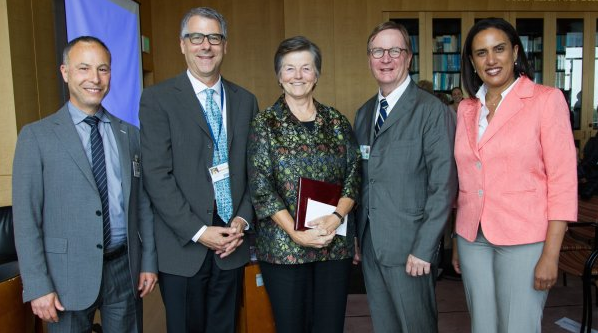
By Leland Kim via UCSF.edu
The term “mentorship” wasn’t part of the health care lexicon when Deborah Grady, MD, MPH, graduated from medical school back in 1980. And the landscape of medicine looked very different back then: Less than a third of medical school graduates were women and very few held leadership positions.
Grady credits Virginia Ernster, PhD, former chair of the UCSF Department of Epidemiology & Biostatistics, for cultivating a love and appreciation of mentorship.
“Virginia was fantastic mentor to me. She gave me great advice in both research and career development,” said Grady, interim director of the Clinical and Translational Science Institute (CTSI) and associate dean for Clinical and Translational Research in the Schools of Medicine and Nursing. “Those lessons and advice have stayed with me over the years.”
Grady feels fortunate to have had great mentors early in her career. Not all of her mentors shared her gender, though coincidentally many shared the same first name.
“I had some great male mentors, too,” Grady said. “The person who followed Virginia as chair of epidemiology, Steve Hulley, was a great mentor to me. I still talk with him to this day, and other folks in general medicine such as Steve Cummings, Steve McPhee and Steve Schroeder were also wonderful mentors.”
Paying It Forward
Grady has taken lessons from her mentors and applied them to a growing crop of mentees she has helped shape over the years. Her success in cultivating young talent has led to her winning the Lifetime Achievement Award in Mentorship this year.
“I do it because it’s fun. It’s just fun,” Grady said. “It also broadens my clinical and research perspectives. I work with people doing different kinds of research, sometimes tangential to my main area of research, but I learn a lot about conditions, illnesses and treatments that I otherwise would not know about.”
The Faculty Mentoring Program and the award – now in its seventh year – are part of the Campus Council on Faculty Life (CCFL).
“We’ve built a program that has become a national model,” said Mitchell D. Feldman, MD, MPhil, professor of medicine and associate vice provost for faculty mentoring at UCSF. “And many other academic medical centers have created mentoring programs inspired by what we have done here at UCSF.”
To Grady, mentorship is not gender-specific or even department-specific. Over the years, she has mentored more than 40 young researchers at UCSF.
“I think there’s something to be said about women having women mentors, but probably more to be said for ethnic mentors,” she said. “It’s important for underrepresented minority faculty to at least have some guidance from someone who has an understanding of some of the issues unique to that experience.”
